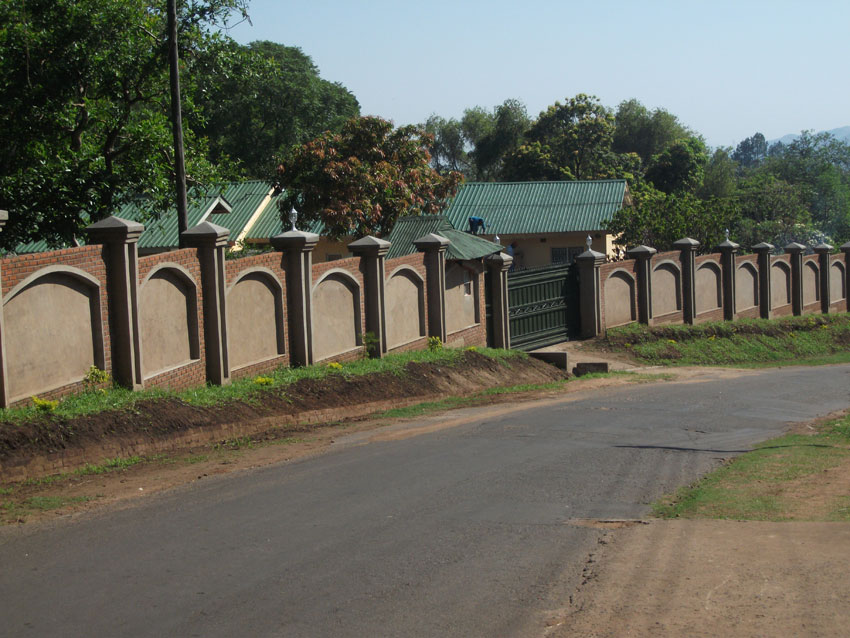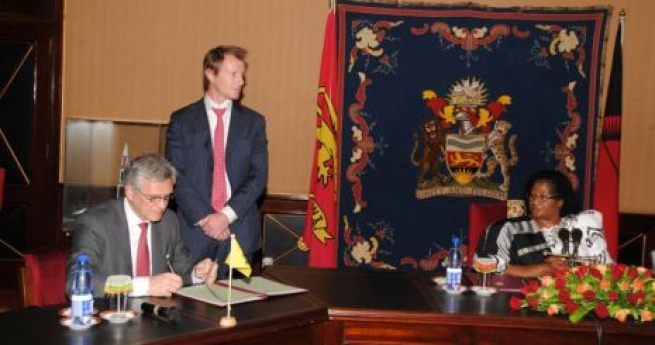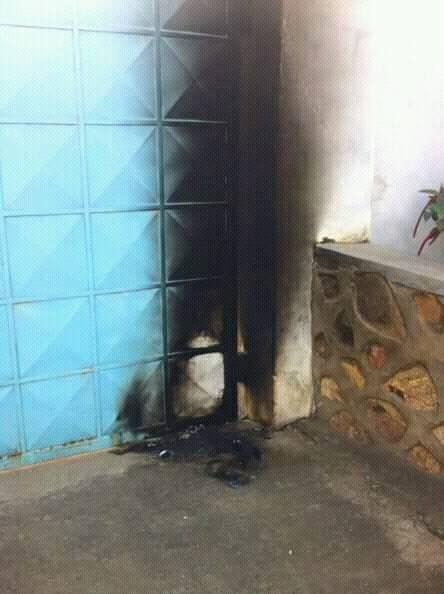The Malawi Revenue Authority (MRA) Board has cleared its recently fired Commissioner General (CG) Lloyd Muhara and his management team of wrongdoing in the K14.3 billion (about $57.2 million) revenue embellishment scandal.
This is a huge win for Muhara and his team who told their board in May this year that it was the Ministry of Finance—which reports revenue figures to Parliament—that misled the country on the revenue position, not the Malawi Revenue Authority (MRA).
The MRA management also told its board at the time that getting instructions from Treasury to borrow to fill revenue shortfalls has been a long-standing arrangement and did not start with them.
With Finance Minister Ken Lipenga also cleared by a President Joyce Banda appointed special Cabinet committee to probe the matter, the move raises the question of whether this means that all the key players in the chain did the right things—borrowing money from local commercial banks without parliamentary approval and declaring it as collected revenue.
Compensation
Muhara, fired at the height of investigations into the borrowing saga, will be paid his dues up to the end of his contract in June 2013.
We could not establish how much the compensation amounts to, but Muhara will get his monthly salary and other benefits; effectively meaning that for a year, MRA will be paying two chief executive officers—a costly arrangement for a country pushing through painful austerity measures.
Government has also indicated Muhara can get a new public service job if an opening arises.
No wrongdoing
The MRA Board cleared the authority’s top brass following its meetings of May 11 and May 23, after which the directors wrote the former CG.
“I would like to mention in passing that the board of directors held meetings on Friday 11th May 2012 and Wednesday 23rd May 2012. The board of directors resolved that you and the rest of the management of MRA were not responsible for the alleged borrowing of funds from commercial banks as widely reported in the media,” reads a letter to Muhara signed by MRA Board chairperson Thom Mpinganjira.
In the letter, also copied to Chief Secretary to Government Bright Msaka, Mpinganjira also referred to earlier meetings between him and Muhara on matters surrounding the borrowing and Muhara’s contract.
“I refer to the discussions I have had with you on Thursday, 24 May 2012. I wish to confirm our agreement that [MRA] should pay you total earnings, all benefits and gratuity which you would have been entitled to from 1st June 2012 to the end of your contract at the end of June 2013. All non-cash benefits will be converted to cash for this purpose,” reads Mpinganjira’s letter in part.
The payment will include accumulated leave days Muhara did not take during his term of office, according to the letter.
“I would, however, like to point out that I have been informed by the Chief Secretary to the Government that you will be assigned other duties within the public service,” Mpinganjira told Muhara.
It seems these discussions took place before Muhara officially handed over office to his successor John Biziwick.
“Following this agreement and in accordance with our discussion, you will hand over the duties of your office to your successor on a day to be agreed between you and your successor. This date to be not later than 1st June 2012,” reads the letter.
In an interview this week, Msaka said: “If a position suitable to him [Muhara] is found, just like every Malawian, he will be considered.”
He could not take further questions on the issue, for example, the aspect of Muhara being earlier dismissed before an exhaustive probe was concluded.
In a separate interview, Mpinganjira confirmed the development, but refused to discuss details and further questions, saying “it will be against ethics of corporate governance.”
“I have the answers to your questions, but in terms of corporate governance, I will be interfering if I begin speaking on these issues,” he said, referring the matter to Biziwick.
But Biziwick said he could not comment on whether Muhara has been paid his dues because “I am roaming, I am away, talk to MRA spokesperson Mr. Steve Kapoloma.”
Kapoloma refused to comment, arguing the matter is personal to Muhara and beyond a spokesperson.
“That is at board level. I would not know and the issue borders on personal emoluments. It will not be good for me to comment on personal issues,” said Kapoloma.
Who then was in the wrong?
If available documents are anything to go by, the clearing of Lipenga, Muhara and his management team leaves budget director in the Ministry of Finance Dr. Dalitso Kabambe, to explain more on the matter. He authored letters authorising part of the borrowing in December 2011.
The MRA borrowed the K14.3 billion to appear to have collected enough to give the impression that the zero-deficit budget (ZDB) was working and help government convince the International Monetary Fund (IMF) that Lilongwe’s fiscal position was on target as per the agreed economic programme.
Earlier communication between Treasury and Muhara shows that the former MRA boss was party to meetings that discussed the borrowing.
“I refer to the discussions the [MRA] held with officials of the Ministry of Finance and Development Planning regarding the above captioned subject matter,” reads the December 30 2011 letter signed by Kabambe authorising Muhara to borrow.
“I wish to advise that after thorough consideration and consultation on the matter, an approval has been granted by government allowing the [MRA] to borrow funds from commercial banks amounting to K7 billion for purposes of the agreements reached at the said meeting.”
In separate letters, Kabambe also requested for the funds from different banks.
On January 3 2012, for example, he wrote Biziwick, then chief executive officer of NBS Bank, requesting “your bank to transfer the sum of K3 billion into the Malawi Government Holding Accounts at the Reserve Bank of Malawi (RBM)…”
The sum was deposited in two different accounts at the RBM: K1.5 billion in Ministry of Lands Holding Account number 300343220709 and K1.5 billion in Safety Net Levy Holding Account number 300343220709.
In total, MRA borrowed K14.3 billion, with K4 billion from the National Bank of Malawi, Standard Bank (K3 Billion), FDH Bank (K800 million), Indebank (K500 million), the Malawi Savings Bank (K1 billion) and NBS Bank (K5 Billion).
The other K2 billion from NBS Bank and the rest of the funds from other banks were deposited in account number 001-400036 between December 30 2011 and January 5 2012.
Kabambe asked for a questionnaire this week when The Nationapproached him on, among others, where he got the mandate to write MRA and the banks. He has not yet responded to the questionnaire.
Parliament carrying out own investigations
Commenting on the clearance of Muhara, Eunice Napolo, chairperson of the Budget and Finance Committee of Parliament, said her committee is not aware of the new developments at MRA, but said the committee is carrying out its own investigations.
“As a committee, we are still investigating the matter. We shall be inviting stakeholders to appear before us. When our report is ready, it will be presented in Parliament. But the issue of MRA borrowing is on our agenda for the next meeting,” she said.
The irregular borrowing was first mentioned in Parliament by Balaka South MP George Nnesa in February this year.
When told of the new developments on Monday, Nnensa agreed with the MRA Board, but faulted an inquiry instituted by President Banda, headed by Vice-President Khumbo Kachali.
Argued Nnesa: “MRA officials were just used for political gains. I sympathise with them. The problem is with the inquiry. How do you send ministers to investigate a fellow minister? That is a kangaroo court. Politicians have a tendency of defending each other. That is exactly what happened.”
Other members of the Kachali committee included Defence Minister Ken Kandodo, who Lipenga succeeded at Treasury; Water and Irrigation Minister Ritchie Muheya and Local Government and Rural Development Minister Grace Maseko.




